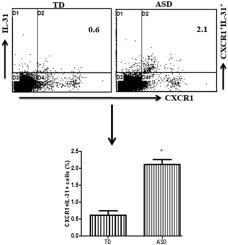当前位置:
X-MOL 学术
›
J. Neuroimmunol.
›
论文详情
Our official English website, www.x-mol.net, welcomes your
feedback! (Note: you will need to create a separate account there.)
Upregulation of interleukin (IL)-31, a cytokine producing CXCR1 peripheral immune cells, contributes to the immune abnormalities of autism spectrum disorder
Journal of Neuroimmunology ( IF 2.9 ) Pub Date : 2020-12-01 , DOI: 10.1016/j.jneuroim.2020.577430 Sheikh F. Ahmad , Mushtaq A. Ansari , Ahmed Nadeem , Saleh A. Bakheet , Laila Y. AL-Ayadhi , Abdulaziz M.S. Alsaad , Mohammed A. Assiri , Haneen A. Al-Mazroua , Sabry M. Attia
Journal of Neuroimmunology ( IF 2.9 ) Pub Date : 2020-12-01 , DOI: 10.1016/j.jneuroim.2020.577430 Sheikh F. Ahmad , Mushtaq A. Ansari , Ahmed Nadeem , Saleh A. Bakheet , Laila Y. AL-Ayadhi , Abdulaziz M.S. Alsaad , Mohammed A. Assiri , Haneen A. Al-Mazroua , Sabry M. Attia

|
Autism spectrum disorders (ASD) are a group of neurodevelopmental disorders characterized by communication deficits, impaired social interactions, and restricted stereotypical behaviors. Several immune cells are associated with immune dysfunction in ASD; however, IL-31 has not been explored in ASD. This study aims to investigate the role of inflammatory cytokines and transcription factors of the CXCR1 cells in children with ASD. In the current study, we investigated the cytokines and transcription factors produced by CXCR1+ cells (IL-31, IL-9, IL-21R, IL-21, NF-κB p65, RORγT, STAT1, and FoxP3) in peripheral blood mononuclear cells (PBMCs), from children with ASD and typically developing (TD) control children, using flow cytometric analysis. In addition, we measured mRNA and protein expression levels of IL-31 using quantitative real-time PCR and western blot analyses in PBMCs. In our study, children with ASD had increased CXCR1+IL-31+, CXCR1+IL-9+, CXCR1+IL-21R+, CXCR1+IL-21+, CXCR1+NF-κB+ p65, CXCR1+RORγT+, and CXCR1+STAT1+, and decreased CXCR1+FoxP3+ cells as compared with cells from the TD control samples. Similarly, children with ASD showed increased IL-31 mRNA and protein expression levels as compared to those of TD control samples. Our results suggest that upregulated production of inflammatory cytokines and transcription factors in CXCR1+ cells cause immunological imbalance in children with ASD. Therefore, attenuation of inflammatory cytokines/mediators and transcription factors could have a therapeutic potential in the treatment of ASD.
中文翻译:

白细胞介素 (IL)-31 的上调,一种产生 CXCR1 外周免疫细胞的细胞因子,有助于自闭症谱系障碍的免疫异常
自闭症谱系障碍 (ASD) 是一组神经发育障碍,其特征是沟通障碍、社交互动受损和刻板行为受限。几种免疫细胞与 ASD 的免疫功能障碍有关;然而,尚未在 ASD 中探索 IL-31。本研究旨在探讨炎性细胞因子和 CXCR1 细胞转录因子在 ASD 儿童中的作用。在目前的研究中,我们研究了外周血单个核细胞中 CXCR1+ 细胞(IL-31、IL-9、IL-21R、IL-21、NF-κB p65、RORγT、STAT1 和 FoxP3)产生的细胞因子和转录因子(PBMC),来自 ASD 儿童和典型发育 (TD) 对照儿童,使用流式细胞术分析。此外,我们使用定量实时 PCR 和蛋白质印迹分析在 PBMC 中测量了 IL-31 的 mRNA 和蛋白质表达水平。在我们的研究中,ASD 儿童的 CXCR1+IL-31+、CXCR1+IL-9+、CXCR1+IL-21R+、CXCR1+IL-21+、CXCR1+NF-κB+ p65、CXCR1+RORγT+ 和 CXCR1+ 增加与来自 TD 对照样品的细胞相比,STAT1+ 和 CXCR1+FoxP3+ 细胞减少。同样,与 TD 对照样本相比,ASD 儿童的 IL-31 mRNA 和蛋白质表达水平增加。我们的研究结果表明,CXCR1+ 细胞中炎性细胞因子和转录因子的产生上调会导致 ASD 儿童的免疫失衡。因此,炎症细胞因子/介质和转录因子的减弱可能在 ASD 的治疗中具有治疗潜力。ASD 儿童 CXCR1+IL-31+、CXCR1+IL-9+、CXCR1+IL-21R+、CXCR1+IL-21+、CXCR1+NF-κB+ p65、CXCR1+RORγT+ 和 CXCR1+STAT1+ 增加,并减少CXCR1+FoxP3+ 细胞与来自 TD 对照样品的细胞相比。同样,与 TD 对照样本相比,ASD 儿童的 IL-31 mRNA 和蛋白质表达水平增加。我们的研究结果表明,CXCR1+ 细胞中炎性细胞因子和转录因子的产生上调会导致 ASD 儿童的免疫失衡。因此,炎症细胞因子/介质和转录因子的减弱可能在 ASD 的治疗中具有治疗潜力。ASD 儿童 CXCR1+IL-31+、CXCR1+IL-9+、CXCR1+IL-21R+、CXCR1+IL-21+、CXCR1+NF-κB+ p65、CXCR1+RORγT+ 和 CXCR1+STAT1+ 增加,并减少CXCR1+FoxP3+ 细胞与来自 TD 对照样品的细胞相比。同样,与 TD 对照样本相比,ASD 儿童的 IL-31 mRNA 和蛋白质表达水平增加。我们的研究结果表明,CXCR1+ 细胞中炎性细胞因子和转录因子的产生上调会导致 ASD 儿童的免疫失衡。因此,炎症细胞因子/介质和转录因子的减弱可能在 ASD 的治疗中具有治疗潜力。与来自 TD 对照样品的细胞相比,CXCR1+FoxP3+ 细胞减少。同样,与 TD 对照样本相比,ASD 儿童的 IL-31 mRNA 和蛋白质表达水平增加。我们的研究结果表明,CXCR1+ 细胞中炎性细胞因子和转录因子的产生上调会导致 ASD 儿童的免疫失衡。因此,炎症细胞因子/介质和转录因子的减弱可能在 ASD 的治疗中具有治疗潜力。与来自 TD 对照样品的细胞相比,CXCR1+FoxP3+ 细胞减少。同样,与 TD 对照样本相比,ASD 儿童的 IL-31 mRNA 和蛋白质表达水平增加。我们的研究结果表明,CXCR1+ 细胞中炎性细胞因子和转录因子的产生上调会导致 ASD 儿童的免疫失衡。因此,炎症细胞因子/介质和转录因子的减弱可能在 ASD 的治疗中具有治疗潜力。
更新日期:2020-12-01
中文翻译:

白细胞介素 (IL)-31 的上调,一种产生 CXCR1 外周免疫细胞的细胞因子,有助于自闭症谱系障碍的免疫异常
自闭症谱系障碍 (ASD) 是一组神经发育障碍,其特征是沟通障碍、社交互动受损和刻板行为受限。几种免疫细胞与 ASD 的免疫功能障碍有关;然而,尚未在 ASD 中探索 IL-31。本研究旨在探讨炎性细胞因子和 CXCR1 细胞转录因子在 ASD 儿童中的作用。在目前的研究中,我们研究了外周血单个核细胞中 CXCR1+ 细胞(IL-31、IL-9、IL-21R、IL-21、NF-κB p65、RORγT、STAT1 和 FoxP3)产生的细胞因子和转录因子(PBMC),来自 ASD 儿童和典型发育 (TD) 对照儿童,使用流式细胞术分析。此外,我们使用定量实时 PCR 和蛋白质印迹分析在 PBMC 中测量了 IL-31 的 mRNA 和蛋白质表达水平。在我们的研究中,ASD 儿童的 CXCR1+IL-31+、CXCR1+IL-9+、CXCR1+IL-21R+、CXCR1+IL-21+、CXCR1+NF-κB+ p65、CXCR1+RORγT+ 和 CXCR1+ 增加与来自 TD 对照样品的细胞相比,STAT1+ 和 CXCR1+FoxP3+ 细胞减少。同样,与 TD 对照样本相比,ASD 儿童的 IL-31 mRNA 和蛋白质表达水平增加。我们的研究结果表明,CXCR1+ 细胞中炎性细胞因子和转录因子的产生上调会导致 ASD 儿童的免疫失衡。因此,炎症细胞因子/介质和转录因子的减弱可能在 ASD 的治疗中具有治疗潜力。ASD 儿童 CXCR1+IL-31+、CXCR1+IL-9+、CXCR1+IL-21R+、CXCR1+IL-21+、CXCR1+NF-κB+ p65、CXCR1+RORγT+ 和 CXCR1+STAT1+ 增加,并减少CXCR1+FoxP3+ 细胞与来自 TD 对照样品的细胞相比。同样,与 TD 对照样本相比,ASD 儿童的 IL-31 mRNA 和蛋白质表达水平增加。我们的研究结果表明,CXCR1+ 细胞中炎性细胞因子和转录因子的产生上调会导致 ASD 儿童的免疫失衡。因此,炎症细胞因子/介质和转录因子的减弱可能在 ASD 的治疗中具有治疗潜力。ASD 儿童 CXCR1+IL-31+、CXCR1+IL-9+、CXCR1+IL-21R+、CXCR1+IL-21+、CXCR1+NF-κB+ p65、CXCR1+RORγT+ 和 CXCR1+STAT1+ 增加,并减少CXCR1+FoxP3+ 细胞与来自 TD 对照样品的细胞相比。同样,与 TD 对照样本相比,ASD 儿童的 IL-31 mRNA 和蛋白质表达水平增加。我们的研究结果表明,CXCR1+ 细胞中炎性细胞因子和转录因子的产生上调会导致 ASD 儿童的免疫失衡。因此,炎症细胞因子/介质和转录因子的减弱可能在 ASD 的治疗中具有治疗潜力。与来自 TD 对照样品的细胞相比,CXCR1+FoxP3+ 细胞减少。同样,与 TD 对照样本相比,ASD 儿童的 IL-31 mRNA 和蛋白质表达水平增加。我们的研究结果表明,CXCR1+ 细胞中炎性细胞因子和转录因子的产生上调会导致 ASD 儿童的免疫失衡。因此,炎症细胞因子/介质和转录因子的减弱可能在 ASD 的治疗中具有治疗潜力。与来自 TD 对照样品的细胞相比,CXCR1+FoxP3+ 细胞减少。同样,与 TD 对照样本相比,ASD 儿童的 IL-31 mRNA 和蛋白质表达水平增加。我们的研究结果表明,CXCR1+ 细胞中炎性细胞因子和转录因子的产生上调会导致 ASD 儿童的免疫失衡。因此,炎症细胞因子/介质和转录因子的减弱可能在 ASD 的治疗中具有治疗潜力。











































 京公网安备 11010802027423号
京公网安备 11010802027423号